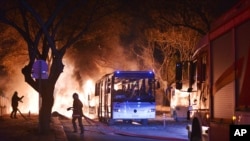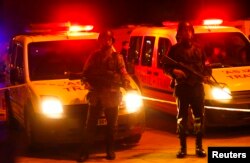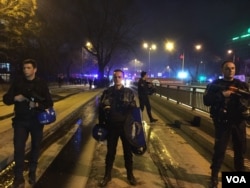Turkish President Recep Tayyip Erdoğan is vowing a firm response to Wednesday's car bomb attack in central Ankara that killed at least 28 and wounded 61.
The car bomb exploded as a convoy of military buses stopped at a traffic light in the Turkish capital, just a few hundred meters from parliament and military headquarters.
No one has claimed responsibility for the bombing. Turkey has seen similar attacks by both the Islamic State group and Kurdish separatist forces in recent months.
Erdoğan said the bombing exceeds all "moral and humane boundaries" and that Turkey will retaliate against both the attackers and the "forces" behind them.
"Turkey will not shy away from using its right to self-defense at any time, any place or any occasion," Erdoğan said.
Witnesses said the blast could be heard across the city. Ambulances and police rushed to seal off the grisly scene, treat the wounded and put out the fires.
The attack prompted Erdoğan to put off a planned visit to Azerbaijan. Prime Minister Ahmet Davutoğlu canceled his trip to Brussels, where he was to have talked about the refugee crisis with other European leaders.
The U.S., a key ally of Turkey, condemned the attack "in the strongest terms," according to a statement by National Security Council spokesperson Ned Price.
"We stand together with Turkey, a NATO ally, a strong partner, and a valued member of the Counter-ISIL coalition, in the face of this attack and pledge our ongoing cooperation and support in the fight against terrorism," the statement read.
Pentagon chief Ash Carter also reaffirmed the U.S. relationship with Turkey. In a statement, Carter condemned the "cowardly" attack, which he said "only strengthens our resolve to deepen our ongoing cooperation in the fight against terrorism."
U.N. Secretary-General Ban Ki-moon said he hopes the perpetrators of the attack "will be swiftly brought to justice."
John Bass, the U.S. ambassador to Turkey, said he was deeply saddened and shocked and sent his prayers out to the victims.
No one claimed responsibility for the bombing, and police did not reveal any clues about who was behind the attack.
The Islamic State group was blamed for last October's suicide bombing at a peace rally in Ankara that killed more than 100 people — the bloodiest single terrorist attack in Turkey since it became a modern state in 1923.
Turkey has also been battling the outlawed Kurdistan Workers' Party, which has been fighting a 30-year guerrilla war for more Kurdish autonomy. The Turkish military has been a frequent target of the militants.
Dorian Jones contributed to this report from Istanbul







